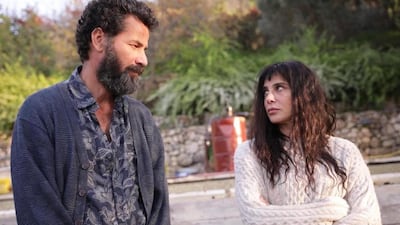Efforts to better the planet’s health can often have unforeseen and frustrating ramifications.
In trying to move away from plastic bags, we’ve triggered what has become known as the cotton tote bag crisis. Electric car production has increased at the expense of the world’s salt flats, which are being harvested for lithium. Metal straws, bamboo forks and mason jars might seem like eco-friendly alternatives to plastic but they, too, have a significant environmental impact.
This sustainability paradox serves as a theme of the second Al Sidr Environmental Film Festival, which will be held at Manarat Al Saadiyat from February 24 to 27.
The theme has been branded the Oasis Paradox to reflect regional environmental issues. The festival seeks to find peace with the ambivalence that comes with tackling the climate crisis as well as various environmental and social issues.
“When we think of oases, it’s this pristine idea that it’s a refuge of trees and water, a green part in an empty desert,” says Nezar Andary, artistic director of Al Sidr Environmental Film Festival. “But sometimes it’s also a place of other issues, such as disease or cash crops.”

“When you look at the history of the environmental movement, this oasis paradox is similar with the electric car and the lithium battery, or it can be the opposite, for example, in order to restart Al Ain Oasis, they had to use desalinated water. These paradoxes are part of what I call 'ecological consciousness'.”
Andary says the paradox does not necessarily need to be interpreted negatively, but rather it should help us view our relationship with nature with a more nuanced perspective. The films in the festival, he says, bring this to light.
“Every film has that in mind,” he says.
The festival will screen a diverse range of features and shorts and will open with the 2016 award-winning documentary Honey, Rain and Dust directed by Nujoom Al Ghanem. The film follows three honey experts in the UAE as they try to continue working amid a growing honeybee crisis.
Other documentaries being shown at the festival include I Am Greta by Fredrik Heining and Cecilia Nessen, which follows the rise of climate change activist Greta Thunberg, as well as the 1982 environmental film Koyaanisqatsi, an eye-opening visual and sonic classic that reveals how estranged we have become from nature.
The festival also includes two fiction films, the award-winning Lebanese film Costa Brava, Lebanon, directed by Mounia Akil, and Son of Monarchs, directed by Alexis Gambis, a New York University Abu Dhabi professor.
It also features Invisible Demons, a Cannes-featured film by Indian auteur Rahul Jain, and will close with Taming the Garden, a Georgian film by director Salome Jashi.
The festival is co-organised by Zayed University and Environment Agency — Abu Dhabi and is supported by Adnoc and The British Council.
“We have decided to provoke audiences with films that ask difficult questions, unlock emotions and increase awareness about the environment,” Andary said.
“In our second edition, we aim to push the local community to imagine, sense and create more in our relationship with the environment. Al Sidr Environmental Film Festival educates and entertains while providing a unique experience for film enthusiasts and those who are passionate about the environment.”
Shaikha Salem Al Dhaheri, Secretary General of Environment Agency — Abu Dhabi, said media and visual arts are vital tools in the fight against environmental issues, as they have the power “to move people and instigate changes in behaviour".
“To highlight positive and impactful environmental work, the development of documentaries and films is key,” she said.
“They are both powerful mediums that can raise awareness about significant and important topics, such as climate change, pollution, loss of biodiversity and degradation of nature, to name a few.
“The number of environmental challenges the world faces today is growing rapidly and events such as Al Sidr Film Festival help shed light on these challenges in a manner that is dynamic, appealing and informative.”
Part of Al Sidr Environmental Film Festival’s mission is to bring together the local community and mobilise action on important environmental and social issues.
The festival includes academic roundtable discussions, which feature biological and political scientists as well as artists who will address a range of topics including the politics behind caring for the planet and the connections between mankind and the environment.
As with the inaugural 2020 event, the festival will also organise virtual screenings of a selection of films in a number of Abu Dhabi schools to engage young minds and involve pupils in the dialogue on climate change and the environment.
Dr Justin Thomas, a psychologist, writer and associate professor at Zayed University, will also discuss the link between climate change and psychological grief. And environmental studies students from Zayed University will present discussion panels aligned with the films' topics and themes.
“With our second edition, we are excited to make Al Sidr Environmental Film Festival an ongoing tradition in Abu Dhabi,” said Fares Howari, dean of the College of Natural Science and Humanities at Zayed University.
“[We] aim to have environmental sciences and sustainability discussed among diverse communities in the UAE. We promote climate change awareness and forge new relationships between the humanities, arts and sciences.”


